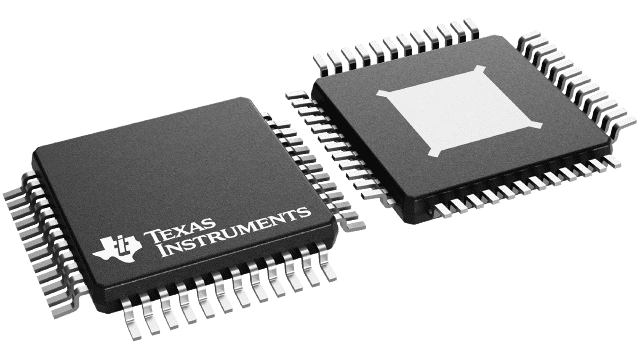Gehäuseinformationen
| Gehäuse | Pins HTQFP (PHP) | 48 |
| Betriebstemperaturbereich (°C) -40 to 85 |
| Gehäusemenge | Träger 1.000 | LARGE T&R |
Merkmale von TUSB4020BI-Q1
- AEQ-Q100 qualified for automotive applications
- Device temperature grade 3: -40ºC to 85ºC TA
- Two-port USB 2.0 hub
- USB 2.0 hub features:
- Multi-transaction translator (MTT) hub: two transaction translators
- Four asynchronous endpoint buffers per transaction translator
- Type C compatible
- Supports battery charging
- CDP mode (upstream port connected)
- DCP mode (upstream port unconnected)
- DCP mode complies with chinese telecommunications industry standard YD/T 1591-2009
- D+/D– divider mode
- Per port or ganged power switching and overcurrent notification inputs
- OTP ROM, serial EEPROM, or I2C/SMBus
slave interface for custom configurations:
- VID and PID
- Port customizations
- Manufacturer and product strings (not by OTP ROM)
- Serial number (not by OTP ROM)
- Application feature selection using terminal selection or EEPROM/ or I2C/SMBus slave interface
- Provides 128-bit universally unique identifier (UUID)
- Supports on-board and in-system OTP/EEPROM programming through the USB 2.0 upstream port
- Single clock input, 24-MHz crystal or oscillator
- No special driver requirements; works seamlessly on any operating system with USB stack support
- 48-Pin HTQFP package (PHP)
Beschreibung von TUSB4020BI-Q1
The TUSB4020BI-Q1 is a two-port USB 2.0 hub. It provides USB high-speed/full-speed connections on the upstream port and provides high-speed, full-speed, or low-speed connections on the two downstream ports. When the upstream port is connected to an electrical environment that supports high-speed and full-speed/low-speed connections, high-speed and full-speed/low-speed USB connectivity is enabled on the downstream ports. When the upstream port is connected to an electrical environment that only supports full-speed/low-speed connections, high-speed connectivity are disabled on the downstream ports.
The TUSB4020BI-Q1 supports per port or ganged power switching and overcurrent protection.
An individually port power controlled hub switches power on or off to each downstream port as requested by the USB host. Also when an individually port power controlled hub senses an over-current event, only power to the affected downstream port will be switched off.
A ganged hub switches on power to all its downstream ports when power is required to be on for any port. The power to the downstream ports is not switched off unless all ports are in a state that allows power to be removed. Also when a ganged hub senses an overcurrent event, power to all downstream ports will be switched off.
The TUSB4020BI-Q1 provides terminal strap configuration for some features including battery charging support, and also provides customization though OTP ROM, I2C EEPROM or through an I2C/SMBus slave interface for PID, VID, and custom port and phy configurations. Custom string support is also available when using an I2C EEPROM or the I2C/SMBus slave interface.
The device is available in a 48-pin HTQFP package and is designed for operation over the industrial temperature range of –40°C to 85°C.
